#StolenMemory: digital and "on the road"
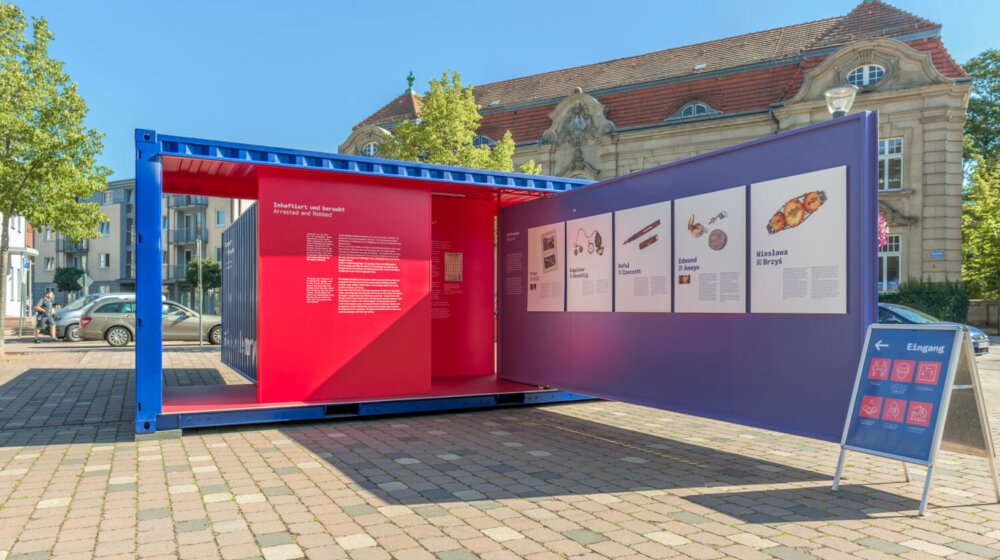
The Arolsen Archives launched the #StolenMemory campaign with the aim of giving back personal items – such as jewelry, letters, or photos – to the families of the former concentration camp prisoners who owned them. #StolenMemory is now also available as a traveling exhibition which tours Germany in a converted shipping container. Short animated films, an app, and a modern website provide virtual points of access. Teaching materials for use in connection with visits to the exhibition are available for download.
It was thanks to funding provided by Germany’s Federal Government Commissioner for Culture and the Media under a program to promote culture in rural areas that we were able to create our interactive #StolenMemory traveling exhibition. Because of this, the destinations on the 2020 tour were small German towns and villages with up to 20,000 inhabitants. However, the coronavirus pandemic forced us to change our plans, and the exhibition was only able to visit a few of the stops on the scheduled route.
Providing information and encouraging participation
Until now, #StolenMemory was mostly realized as ready-to-print exhibition that displays the personal belongings of former concentration camp prisoners on posters and tells the stories of their persecution. The Arolsen Archives still have around 2500 envelopes with personal possessions belonging to people from more than 30 different countries. These items are not part of the archival holdings as such, but are waiting to be returned to the families of their owners.
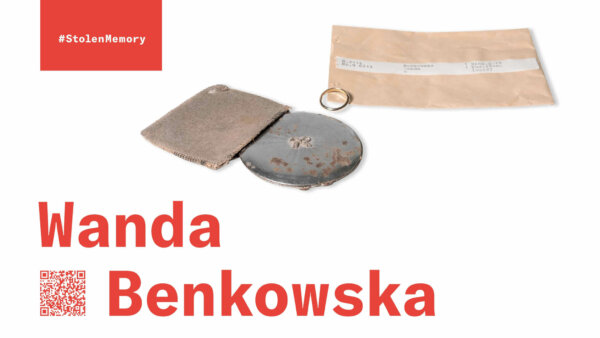
Those items that have already been returned are of immeasurable value to the families concerned. They make remembering and remembrance more tangible and are often the last remaining traces of the victims. So one of the most important messages #StolenMemory wants to get across is this: Anyone can help the Arolsen Archives find relatives and return objects. And the traveling exhibition has many a story to tell about objects that have been successfully returned to their rightful owners.
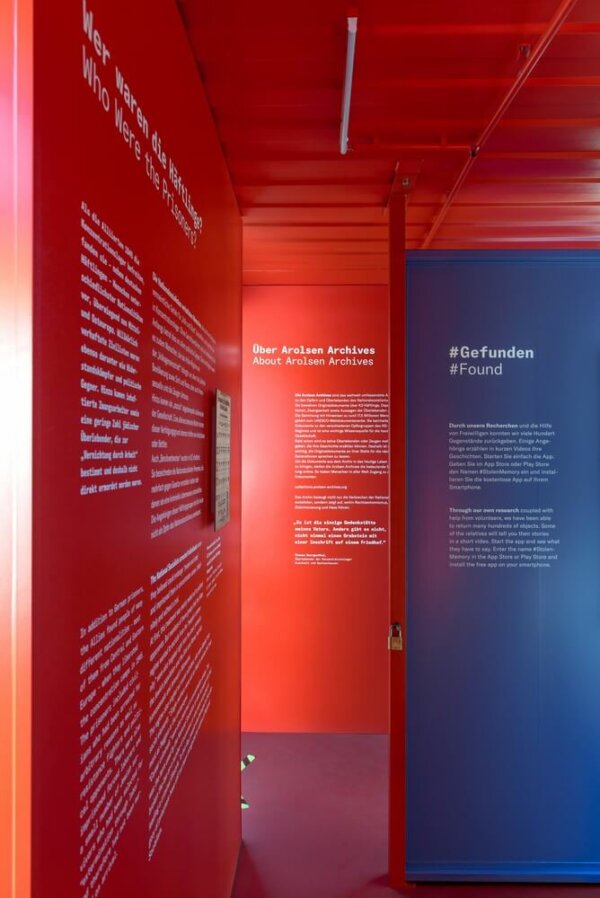
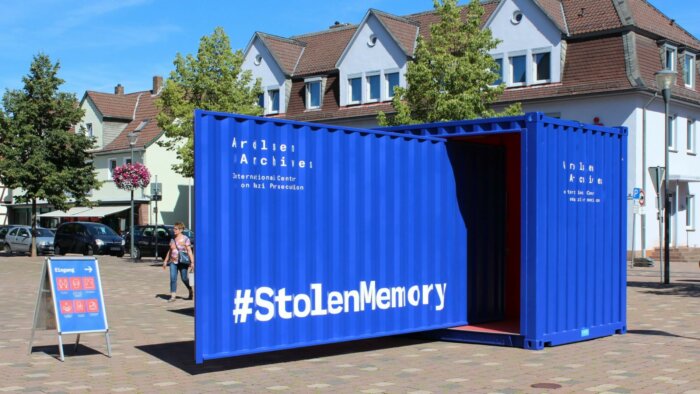
Mobile exhibition
The traveling exhibition display the posters in a mobile, converted shipping container on side walls that fold out. It was designed by architect Stefan Blaas and was engineered and built by a Berlin-based company called Container-Manufaktur. As well as providing background information on the work of the Arolsen Archives, the exhibition also covers two major aspects of the campaign: A section titled “Found” features effects that have already been returned to family members, while the “Searching” section focuses on effects that are still waiting to be returned.
Successful summer kick-off
We were only able to show the exhibition between August and October 2020 because of the coronavirus pandemic, but the container visited seven different locations throughout Germany during that period. The exhibition met with a very favorable response and was always well attended. The feedback we received from the local communities and initiatives supporting #StolenMemory was entirely positive. We have since been inundated with inquiries from other towns that want to host the exhibition, and this high demand prompted us to order a second exhibition container for 2021.
« This exhibition is moving and distressing at the same time. These very unique exhibits take us into the deepest and darkest chapters of our history. It is important to bring these moments to mind over and over again, especially for younger generations. »
Carsten Behnk, Mayor of the City of Eutin / Schleswig-Holstein
Educational work with #StolenMemory
In Eutin, #StolenMemory showed the enormous potential the exhibition has for educational work. Educational materials we had only recently developed were used there for the first time in close cooperation with the Eutin State Police School. The police cadets were particularly impressed by the fact that two of the life stories portrayed reflect the situation police officers were in during the Nazi era. The film and the web story about Johannes Berens, in particular, show how the Dutch policeman refused to cooperate with the German occupiers when they asked him to arrest escaped Jews. Politician Aminata Touré, Vice President of the Schleswig-Holstein State Parliament and a member of the Green Party, accompanied the cadets on their visit to the exhibition.
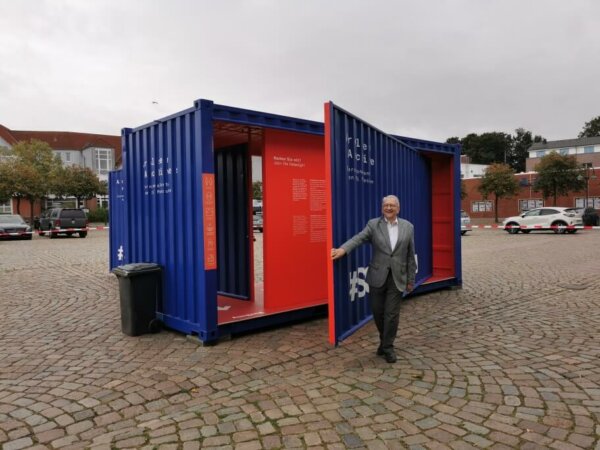
Mayor Carsten Behnk opened the #StolenMemory traveling exhibition in Eutin.
When the second exhibition container hits the road in 2021, it will also visit large towns and communities, and its itinerary is likely to include Munich, Berlin, and Dortmund. In 2022, we plan to show the traveling exhibition in Poland, so the new container will feature a convertible interior that will make it easy to integrate Polish translations. A large number of the personal effects that are stored at the Arolsen Archives are the property of people whom the Nazis deported to German concentration camps from Poland.
Virtual offerings bring fates to life
The #StolenMemory website that goes with the exhibition provides a wealth of fascinating insights. Short animated films with supplementary web stories and interviews with relatives tell of the fates of a number of individuals. The website also includes educational materials, provides information about the route of the traveling exhibition, and shows 360-degree views of some of the objects.
Not only does the traveling exhibition concept include the content displayed on-site and on the website, it also features an augmented reality app with videos of some of the relatives telling the stories behind the objects. Anyone who downloads the app and points their smart phone at one of the “Found” posters can watch a short film. Relatives of the objects’ owners describe the persecution their family members suffered and talk about what the objects mean to them now they have been returned.

